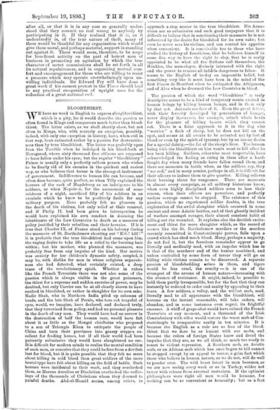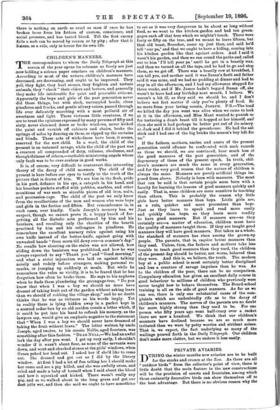BLOODTHIRST.
WE have no word in English to express slaughter-thirst, which is a pity, for it would describe the passion so often found in Kings and conquerors much better than blood- thirst. The latter exists, as we shall shortly show, but not often in Kings, who, with scarcely an exception, possibly, indeed, with only one exception in history, have, when evil in that way, been animated rather by a passion for destructive- ness than by true bloodthirst. The latter was probably upon Ivan the Terrible when he indulged in his blood-bath at Novogorod, where sixty thousand free citizens are supposed to have fallen under his eyes; but the regular " bloodthirsty" Prince is usually only a perfectly callous person who wishes to be finally rid of his enemies in the quickest and easiest way, or who believes that terror is the strongest instrument of government. Indifference to human life can become, and often does become, quite perfect, as when Tilly explained the horrors of the sack of Magdeburg as an indulgence to his soldiers, or when Napoleon, for the amusement of some mistress of a night, sacrificed fifty of his soldiers in an escalade which he knew to be positively futile for any military purpose. Nero probably felt no pleasure in the death of his victims, but only relief at their removal, and if Philip IL bad been given to introspection he would have explained his own conduct in dooming the inhabitants of the Low Countries to death as a measure of policy justified by their rebellion and their heresies. If it is true that Charles IX. of France stood on his balcony during the massacre of St. Bartholomew shouting out " Kill ! kill !" it is probable that the true bloodthirst had come upon him, the raging desire to take life as a relief to the burning hate within ; but his mother, who planned the massacre, was probably free from any impulse of the kind. Her motive was anxiety for her children's dynastic safety, coupled, it may be, with dislike for men in whose religious separate- ness she had detected, what certainly existed, a deep trace of the revolutionary spirit. Whether in rulers like the French Terrorists there was not also some of the passion which is always visible in the great poisoners, the thirst for a supreme and sudden exercise of power, maybe doubted, but only Carrier can be at all clearly shown to have exulted in bloodshed, or rather in slaughter for its own sake. Nadir Shah, who in Northern India piled up columns of heads, and the late Shah of Persia, who tore out traysful of eyes, would, we imagine, have declared, and declared truly, that they terrorised from policy, and had no personal pleasure in the death of any man. They would have had no sorrow in the destruction of half the human race, would have felt about it as little as the Mongol chieftains who proposed to a son of Tchengis Khan to extirpate the people of China and turn their provinces into grassy steppes ex- cellent for feeding horses, but if all their world had been patiently submissive they would have slaughtered no one. It is difficult for modern minds to realise the mental condition of such men, or conceive that they could be free from a devilish last for blood, but it is quite possible that they felt no more about killing in cold blood than great soldiers of the more brutal type have felt about killing on the field of battle. Such horrors were incidental to their work, and they overlooked them, as Marcus Aurelius or Diocletian overlooked the suffer- ings of the thousands of Christians whom they doomed to painful deaths. Abdul-Havaid seems, among rulers, to
approach a step nearer to the true bloodthirst. His Arme- nians are so submissive and such good taxpayers that it is difficult to believe that in sanctioning their massacre he is not influenced by the desire for bloodshed for its own sake; but even he never sees his victims, and can control his appetite when convenient. It is conceivable too to those who have studied the history of fanaticism, that he believes himself in some dim way to have the right to slay, that he is really appointed to be what all the Sultans call themselves, the Hunkiar, the man-slayer, divinely intrusted with the right and the power to remove all infidels dangerous to Islam. It seems to the English of to-day an impossible belief, but something very like it must have been in the mind of the first Simon de Montfort when he extirpated the Albigenses, and of Alva when he drowned the Low Countries in blood.
The passion of which the word " bloodthirst " is truly descriptive seems to be a kind of temporary mania excited in human beings by killing human beings, and in than only by that act. Animals are free of it. Even the great ft.] ICa•, with their ferocity developed by generations of hunger, never display it,—sever, for example, attack whole h&rds for the pleasure of killing beasts which they cannot eat. There is a faint approach to it in the dog who " worries " a flock of sheep, but he does not kill on the spot, and seems at all events to be actuated not by lust of blood or even by the spirit of tyranny, but by an insane desire for a special dainty,—the fat of the sheep's liver. The human being with the bloodthirst on him wants most to kill after he has been killing. Soldiers, otherwise most respectable, have acknowledged the feeling as rising in them after a bard-, fought day when many friends have fallen round them, and there are moments in battle when, as the soldiers say, they. " see red," and in many armies, perhaps in all, it is difficult for their officers to induce them to give quarter. Killing relieves their burning thirst for vengeance. There are moments. in almost every campaign, as all military historians know, when even highly disciplined soldiers seem to lose their reason, when their officers are powerless, and perfectly useless carnage cannot be stopped. The existence of this passion, which no experienced soldier doubts, is the true explanation of the awful slaughter which occurred in some ancient and some Asiatic battles, and of that ghastly incident of warfare amongst savages, their almost constant habit of killing out the wounded. It explains also the devilish excite- ment and thirst for more slaughter which, as the record of scenes like the St. Bartholomew murders or the murders recently committed in Constantinople proves, falls upon a crowd which has shed much blood. Many, perhaps a majority, do not feel it, but the ferocious remainder appear to go literally and medically mad, with an impulse which has in it that of the murderer and of the hunter combined, and unless controlled by some form of terror they will go on killing while victims remain to be discovered. A separate passion of bloodshedding arises in them, and tigers would be less cruel, the cruelty — it is one of the strangest of the arcana of human nature—increasing with the absence of resistance. It might, indeed, be possible to hold them partly irresponsible, but for the fact that they can instantly be reduced to order and sanity by appealing to their fears. A few soldiers, a volley, and the wiliest mob, mad, literally mad to all appearance with the bloodthirst, will become on the instant reasonable, will take orders, will abandon, and in some instances even regret, its frightful excesses. A whiff of grape-shot would have calmed the French Terrorists at any moment, and a thousand of the Irish Constabulary with rifles would restore the worst mob of Con. stantinople to comparative sanity in ten minutes. It ie because the English as a rule are so free of the blood- thirst that we dare be so lenient with our mobs, and because the rulers of foreign States know and dread the impulse that they are, as we all think, so much too ready to resort to violent repression. A Southern mob, an Asiatic mob, or an African mob which has once begun to kill cannot be stopped except by an appeal to terror, a grim fact which those who believe in human nature, as we do not, will do well to ponder over. The wild beast latent in man becomes, as we are now seeing every week or so in Turkey, wilder not tamer with release from external restraints. If the optimist philosophers were right all men would be humane, for nothing can be co convenient as humanity ; but as a fact
there is nothing on earth so cruel as man if once he has broken loose from his fetters of custom, conscience, and social pressure, and has tasted blood. Till the first enemy falls a mob can be moved by reason or by pity ; after that it listens, as a rule, only to terror for its own life,



































 Previous page
Previous page